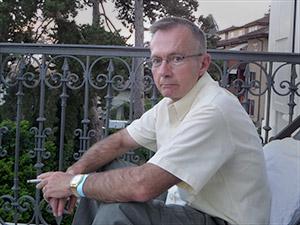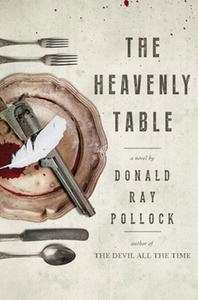 Donald Ray Pollock dropped out of high school when he was 17. He became an author after working at an Ohio paper mill from 1973 to 2005, abandoning his addiction to drugs and drink, and going to college. When he was 40, he got an Ohio University degree and went on to earn an MFA from Ohio State. All three of his books are based primarily in Ohio. His first book, short stories about drugs and drink, is titled Knockemstiff, the name of the blue-collar village where he spent his youth. It won the PEN/Robert W. Bingham Fellowship Award in 2009. His first novel, The Devil All the Time, imagined a husband and wife as serial killers. In 2011, GQ celebrated it as a Book of the Year and the Los Angeles Times praised it as "a significant voice." His second novel, The Heavenly Table (Doubleday, July 12), deals with crime in 1917. It's mostly about two troubled families: the three Jewett brothers, ages 23 to 17, who turn to crime and murder; the other, an honest and poor couple. They end up joined in a surprising way.
Donald Ray Pollock dropped out of high school when he was 17. He became an author after working at an Ohio paper mill from 1973 to 2005, abandoning his addiction to drugs and drink, and going to college. When he was 40, he got an Ohio University degree and went on to earn an MFA from Ohio State. All three of his books are based primarily in Ohio. His first book, short stories about drugs and drink, is titled Knockemstiff, the name of the blue-collar village where he spent his youth. It won the PEN/Robert W. Bingham Fellowship Award in 2009. His first novel, The Devil All the Time, imagined a husband and wife as serial killers. In 2011, GQ celebrated it as a Book of the Year and the Los Angeles Times praised it as "a significant voice." His second novel, The Heavenly Table (Doubleday, July 12), deals with crime in 1917. It's mostly about two troubled families: the three Jewett brothers, ages 23 to 17, who turn to crime and murder; the other, an honest and poor couple. They end up joined in a surprising way.
Is this your first fiction set before you were born?
Well, yes, pretty much. A bit of The Devil All the Time takes place in the 1940s, but I was born soon after, in 1954, so that really doesn't count. The Heavenly Table is set in 1917, and I started out intending to write an historical novel about Camp Sherman, a huge army training base that the government built on the edge of Chillicothe, Ohio, right after America declared war on Germany. Then one morning, while I was working on the first draft, the Jewett brothers suddenly appeared, and I decided to go with them instead of the camp. To be honest, it was a relief. Trying to write a true historical fiction felt too restrictive to me, and I'd also begun to worry that I just wasn't talented enough to do it properly. Once I decided that I was just going to make stuff up and not follow the facts, it became a little easier to write.
There's little that's heavenly about most of your characters.
For most of the characters being evil or seriously messed up, well, those are the people I tend to write about, and they probably do overshadow the decent ones at times, but I do believe there are several characters in this book who would qualify for a place at the heavenly table. You describe one of your characters, young Eddie, as a "boozehound." Does that describe some of your youth?
You describe one of your characters, young Eddie, as a "boozehound." Does that describe some of your youth?
I didn't realize it until now, but I guess maybe Eddie is loosely based on myself, at least as far as the drinking and the running away from home. That was a long time ago.
Is Meade, the main settling for the novel, based on a real town?
Meade is what I call Chillicothe, the town I have lived in since I was 18. I changed the name in my first book, Knockemstiff, mostly because I worked for 33 years at the Mead Paper Mill located there. The mill had such a huge impact on my life and also on the town--it's been there for way over 100 years--that it just seemed the thing to do at the time, and I've stuck with it. Too, strangers sometimes find Chillicothe a hard name to pronounce.
How would you answer a question raised in the novel, "Wasn't being queer bad enough without being so damn blatant about it?"
I was just trying to figure out what a soldier who was gay and wanting to keep it a secret might have thought about his more reckless and flamboyant lover. After all, the story takes place in 1917, not 2016.
Was the racial dismissal of World War I by Sugar, who's black, a product of history or your imagination?
That was all imagined, though during that time there were, for instance, a lot of people who didn't want black soldiers fighting alongside white soldiers. That was true even in the Second World War. Sugar might be a drunk and a murderer, but he is a little more worldly than the other black men in those scenes who are waiting to join the army. He resents white people for good reasons and he's not going to be tricked into fighting for them.
Most of the young female characters are prostitutes, but Cane, the only of the three brothers who can read, meets a young female bookseller who shares his admiration of Shakespeare. Why does she get only three pages?
My plan was to start the book out slow and increase the pace as it went along. By the time I got to the lady in the bookshop, I was trying to set everything into place for the ending, and I thought it would slow the story down if she was given any more pages than that.
Why do you write in short chapters?
I think I do that for two reasons. One being that I'm not a very good writer and short chapters are easier to write than long ones; and two, because I want the book to move along at a quick pace.
In your acknowledgements, why do you thank Dr. Ron Salomone "for riding my ass to finish the damn thing?"
Ron Salomone is a retired English professor from Ohio University and a damn good friend of mine. He helped me finish the book by asking me every other time I saw him if it was done yet, thus making me always aware that it wasn't done yet. As for taking so long to write it, it wasn't a case of writer's block or anything like that. I was lucky in that The Devil All the Time did well in Europe, and I kept getting invited over there, and I went every time. Unfortunately, traveling takes a lot out of me, and so a few days in, say, France, meant that it would take several weeks to get back into the rhythm of the work. Plus my wife and I bought another house, and I worked on it obsessively for a long time before we moved in. Too, I'm just lazy.
What's next? Another five years?
Lord, I hope not. I turned 61 years old a few months ago, and the value of time has suddenly become very clear to me. I'm already committed to traveling quite a bit this year for The Heavenly Table, but after that's over I'm going to pretty much stay home and work until I finish the next one, a novel tentatively called Rainsboro.
About what?
It's set in the late '50s when a mother runs away from home with her son, but it could totally change. --Bob Minzesheimer

